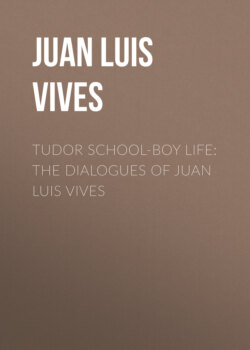Читать книгу Tudor school-boy life: the dialogues of Juan Luis Vives - Juan Luis Vives - Страница 12
The Greek Words in Vives’ Dialogues
ОглавлениеOne of the criticisms frequently urged against Vives is that he used Latinised Graecisms very frequently. It is not improbable that this very fact helped to secure the success of the book, for though there was by 1538 considerable enthusiasm in the aspiration of learning Greek, there was little knowledge of that language as yet even amongst the learned. To know even a small vocabulary of Greek words was a distinction, and to have such knowledge whilst learning to speak Latin was the basis for acquiring at least a smattering of Greek knowledge later on. Sir Thomas Elyot in his Gouvernour (1531) wishes the child “to learn Greek and Latin authors at the same time, or else to begin with Greek. If a child do begin therein at seven years of age, he may continually learn Greek authors three years, and in the meantime use the Latin as a familiar language.” It was, no doubt, the desire of Vives, as of Sir Thomas Elyot, that children should learn as much as possible of Greek at the same time as Latin, and although the introduction of Greek words into the dialogues would not help the systematic study of Greek, it helped to create the atmosphere into which the study of Greek would find its place naturally enough in time.
The introduction of Greek words and phrases by Vives into his School Dialogues did not at any rate prevent the book from being in great demand, whilst the acknowledged difficulty of school teachers in translating the Greek terms brought about a series of expositions and commentaries on the School Dialogues that almost raised the book to the dignity of an ancient classical work. Issued first in 1538, in 1548 an edition was produced at Lyons with a commentary by Peter Motta and a Latin-Spanish index by Joannes Ramirus. In 1552, at Antwerp, Peter Motta’s interpretaxxxvition of Greek words, together with the old and somewhat obscure points in Vives, was supplemented by an alphabetical index of the more difficult words rendered into Spanish, French, and German. In 1553 Aegidius de Housteville published at Paris an edition, especially prepared for French boys, which gave the French for all difficult Latin words and included the commentary of Peter Motta.
